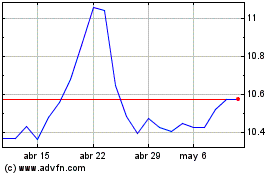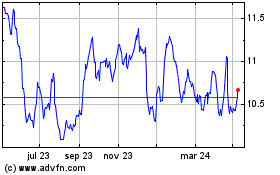Poland Tries to Balance Reliance on Huawei With Spy Fallout
14 Enero 2019 - 5:21AM
Noticias Dow Jones
By Matthew Dalton
WARSAW -- In the decade since arriving in Poland, Huawei
Technologies Co. has established itself as a pillar of the
country's telecommunications network and one of its most
high-profile foreign corporations.
But in recent months, Polish authorities had quietly grown
concerned that the nation's deep reliance on Huawei has exposed it
to espionage threats from Beijing.
Those worries burst into the open Friday with the arrest of a
Huawei employee here.
Authorities brought espionage charges against the man a Polish
employee of the telecommunications conglomerate Orange SA. Both men
are in jail, and their attorneys couldn't be reached for comment.
Huawei said over the weekend it had fired the individual and his
alleged actions "have no relation to the company."
In the wake of the bombshell arrest, Polish security officials
are debating how to defuse any potential security threats related
to Huawei without crippling their own telecommunications
infrastructure, or angering Beijing. The case raises international
pressure on Huawei over fears that the company could be used by
Beijing to spy in the dozens of countries where it operates.
Polish officials said over the weekend they had been examining
the security issues linked to the use of Huawei equipment for some
time and were considering whether to restrict the company's ability
to sell in Poland. The U.S. in particular has been pushing allies
to exclude Huawei from supplying equipment for next-generation, or
5G, networks. The U.S. has said Huawei could be forced by Beijing
to use its knowledge of its equipment to spy on or disable foreign
networks. Huawei has said it is an employee-owned company that
isn't beholden to Beijing.
Poland's membership in the North Atlantic Treaty Organization
has heightened urgency surrounding the nation's relationship with
Huawei. "The information and signals we receive from NATO lead us
to want to issue a recommendation in the near future," Karol
Okoński, Poland's top cybersecurity official, told Polish media
over the weekend.
Limiting Huawei would have significant consequences for both
Poland and the company. By some estimates, Huawei has nearly 50% of
the Polish telecommunications infrastructure market, selling
everything from routers to cellphone towers and network security
services to Poland's four telecommunications operators.
Mr. Okoński said the authorities were examining how widely
government agencies and officials rely on Huawei gear. "We check to
what extent Huawei equipment was ordered and used in public
administration, state companies, especially those belonging to the
critical infrastructure," he said.
For Huawei, Poland represents one of its biggest markets outside
China and a base of operations for its business across central and
Eastern Europe. The Polish government is in the process of rolling
out several major telecommunications projects that would represent
a large chunk of business for Huawei. Orange SA and T-Mobile US
Inc., two of Poland's carriers, have already chosen Huawei for 5G
demonstration projects.
Huawei also is a major supplier of smartphones in the country.
The company has snagged Poland's most popular athlete, soccer star
Robert Lewandowski, as a brand ambassador, making Huawei instantly
recognizable to many Polish consumers. Huawei held a 33.5% share of
Poland's smartphone market, second to Samsung Electronics Co., in
2018's third quarter, according to research-firm IDC.
For carriers around the world, excluding Huawei is a tough sell.
The Shenzhen-based company led the global telecom-equipment
industry with 28% market share in 2018's first three quarters,
according to research-firm Dell'Oro Group, with essentially no
presence in the U.S. market. Some major carriers say Huawei's
equipment for 5G is the best in the industry.
The espionage case is likely to amplify doubts that some Polish
officials have long had about Huawei, at a critical moment for
winning telecommunications contracts in the country.
"There will be many more question marks," said Krzysztof
Szubert, a former senior official in Poland's Ministry of Digital
Affairs.
Details of the charges against the two men remain murky. Mr.
Okoński said the case concerns economic espionage, not potential
security backdoors inserted into Huawei's equipment.
The executive who was arrested, identified as Wang Weijing, was
responsible for raising Huawei's profile in Poland, serving as the
company's public relations director for five years. He was often
the public face of the company at conferences and events around
Poland. In his most recent role, his job was to sell Huawei gear to
government entities.
"They spent a lot of time building their reputation here," Mr.
Szubert said.
Write to Matthew Dalton at Matthew.Dalton@wsj.com
(END) Dow Jones Newswires
January 14, 2019 06:06 ET (11:06 GMT)
Copyright (c) 2019 Dow Jones & Company, Inc.
Orange (EU:ORA)
Gráfica de Acción Histórica
De Mar 2024 a Abr 2024

Orange (EU:ORA)
Gráfica de Acción Histórica
De Abr 2023 a Abr 2024
